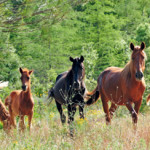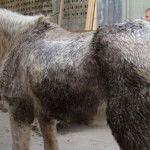 When we think of horses we think of wild, free and sensitive animals; most people would not consider killing horses for food. But in Italy horse meat is eaten. It can even be found in baby food. This is something that most tourists going to Italy do not know about. And in fact something that vegans and animal activists in Italy are very concerned about.
When we think of horses we think of wild, free and sensitive animals; most people would not consider killing horses for food. But in Italy horse meat is eaten. It can even be found in baby food. This is something that most tourists going to Italy do not know about. And in fact something that vegans and animal activists in Italy are very concerned about.
Horse in Italian is cavallo. It comes under the name carne di cavallo, which literally means horse meat. Bresaola, a popular type of sliced meat in Italy, is often made from horse meat. It will usually be marked bresaola di cavallo, but sometimes is also made from cow.
 Horses are exploited in other arenas such as polo games, horse racing and other sports. In Europe, horses will fall into 2 categories: sport horses specifically raised to be slaughtered and sport horses that are only sport horses that should not be eaten. The sport horses that are sent to slaughter after their careers amounts to about 40%. Their meat is deemed “healthy”. The other 60% are not. These horses may have been given steoroids, antibiotics, injections and pharmaceuticals for racing and their meat is not deemed safe. It is deemed unsafe even for cat and dog food. However, it ends up in the food supply anyways, sometimes mixed with beef or other animal byproducts. So what happens?
Horses are exploited in other arenas such as polo games, horse racing and other sports. In Europe, horses will fall into 2 categories: sport horses specifically raised to be slaughtered and sport horses that are only sport horses that should not be eaten. The sport horses that are sent to slaughter after their careers amounts to about 40%. Their meat is deemed “healthy”. The other 60% are not. These horses may have been given steoroids, antibiotics, injections and pharmaceuticals for racing and their meat is not deemed safe. It is deemed unsafe even for cat and dog food. However, it ends up in the food supply anyways, sometimes mixed with beef or other animal byproducts. So what happens?
It is illegal to use these horses for meat that were used specifically for sport. In Italy alone, about 300-800 thousand sport horses every year should be “retired” and living out the rest of their days, however they are unaccounted for. These horses have been sent to slaughter. Horse owners will sell them on the black market to avoid keeping them, since the costs of keeping a retired race horse can be costly. Horses that can normally live for up to 30 years will be used for food sometimes after only 2 or 3 years.
Thanks to vegans, activists and agencies such as the Italian Horse Protection Agency of Italy and Horse Angels, more is being done to spread the word and to tell people Stop! Horses, as all animals, are not our property and they are not for exploitation.
